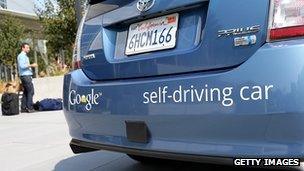Can UK science navigate around the Valley of Death?
- Published

Observers bemoan the propensity for British brilliance to stumble into no-man's land
Britain could be the best place in the world to pioneer eight key areas of science - everything from robotic cars to synthetic organisms to strange new materials.
Or the country that fostered the Industrial and Agricultural Revolutions could succumb to the all-too-familiar affliction of coming up with astonishing inventions only to see others walk off with the profits.
That's the stark choice of scenarios laid out by the science minister David Willetts in an examination of the potential and pitfalls of British research in the years ahead.
The assessment comes in a pamphlet, Eight Great Technologies, external, published by the think-tank Policy Exchange.
The technologies were first identified in a speech by the Chancellor George Osborne at the Royal Society and have been selected for their scientific importance, Britain's "distinctive capability" and the chance of commercial opportunities.
In other words, they are all areas in which Britain should not only excel but also benefit from the flourishing of whole new industries and new jobs.
The optimistic scenario involves Britain leading in exciting new realms such as regenerated body tissue and tiny satellites and the handling of 'big data' to improve health care and weather forecasting.
In talking of these advances, Mr Willetts carries the infectious enthusiasm of anyone who has spent time hearing the imaginative visions of inventors and scientists and entrepreneurs.
Generation skipped
Ideas include a British-designed car that could "drive you down the M1 in five years' time", the reusable Skylon spaceplane, which we reported on last year, "skipping a generation in launch technologies", and robotic submarines that could travel unmanned for six months at a time under the Arctic ice sheet measuring environmental change.
Britain's unique history of record-keeping - of the weather, of NHS patients and of agricultural research - is also suddenly of modern scientific value. Combined with excellence in software-writing, it should also provide great opportunities for new tools for 'data mining' and new hubs for IT.

Mr Willetts recently took a tour in Google's autonomous car
But the minister's admiration for British ingenuity is mingled with a barely-concealed dread: that the most promising offerings from the labs might not be turned into commercial products by British companies.
His worry is nothing new. His predecessors and others in the field have long bemoaned the fact that so much British brilliance stumbles into the notorious "valley of death" that must be crossed for a new idea to make it to the market place.
The "valley" is the stage where adventurous investors, including the public sector, are meant to step in to help fund the crucial but risky transition from concept to product.
From the development of the jet engine and liquid crystal displays, from cracking the inner workings of DNA to pioneering work on Lithium-ion batteries, the country has all too often managed to break new scientific ground but then fail to capitalise on the vast potential that others then enjoy.
Only last month we reported that though the 'miracle material' graphene was first isolated in Manchester University, the race to secure patents on it - and thus try to make money from it - is being won by China and the United States.
Even the South Korean electronics giant Samsung has nearly 10 times more graphene patents than the UK as a whole.
Third pillar
Obviously there are some successes. The chip designer ARM grew out of the BBC Acorn computer project. And Manchester University and others will fight back in the graphene patents contest.
But the challenge, Mr Willetts believes, is to overcome a historic legacy of underinvestment - and a lack of policy attention - in the R&D stage that can see ideas successfully cross the perilous valley.
"Strong markets and flexible markets is a good combination. But, like patriotism, it is not enough. It misses out crucial stuff in the middle - real decisions on backing key technologies on their journey from the lab to the marketplace.
"That is the missing third pillar to any successful high-tech strategy…
"It is our historic failure to back this which lies behind the familiar problems of the so-called 'valley of death'."
One striking example came with the Lithium-ion batteries - very successfully exploited by Japan.
"It was the gap between our basic science and the manufacturing techniques which gave the Japanese their chance. We must not repeat that mistake."
So what can be done? Mr Willetts is just back from the sunshine and energy of San Francisco. He was driven in Google's autonomous car, obviously loved it and looks to two crucial differences between the support offered by the British and American governments.
First, US public funding continues for longer in the lifecycle of a new idea to bring it closer to market.
Parental misguidance?
By contrast, Mr Willetts describes the British policy in terms that capture the brutality of the natural world.
"Sometimes our approach can look like mother birds pushing their fledglings out of the nest but with too many falling to the forest floor to be eaten by foxes."
Second, the US government continues its support beyond the research stage through procurement: by placing big orders with small new companies.
"Silicon Valley originally grew on the back of contracts from the military for computers and IT."
One major effort here is made with the Technology Strategy Board, a body that endeavours to combine public and private finance to nurture new technologies.
But beyond that, Mr Willetts is thinking of a "Leadership Council" bringing together ministers, business people, officials and researchers to prepare "road maps" on technologies - to smooth out regulations and foster development.
He looks ahead 10 years to ask whether the "Great Eight Technologies" will still be in the lab or developed abroad; whether they will have spawned new British Googles and Facebooks or attracted multinationals around British research centres.
No single path is certain, he admits. But the good ones involve pushing against the tide of technological history, and that's never easy.